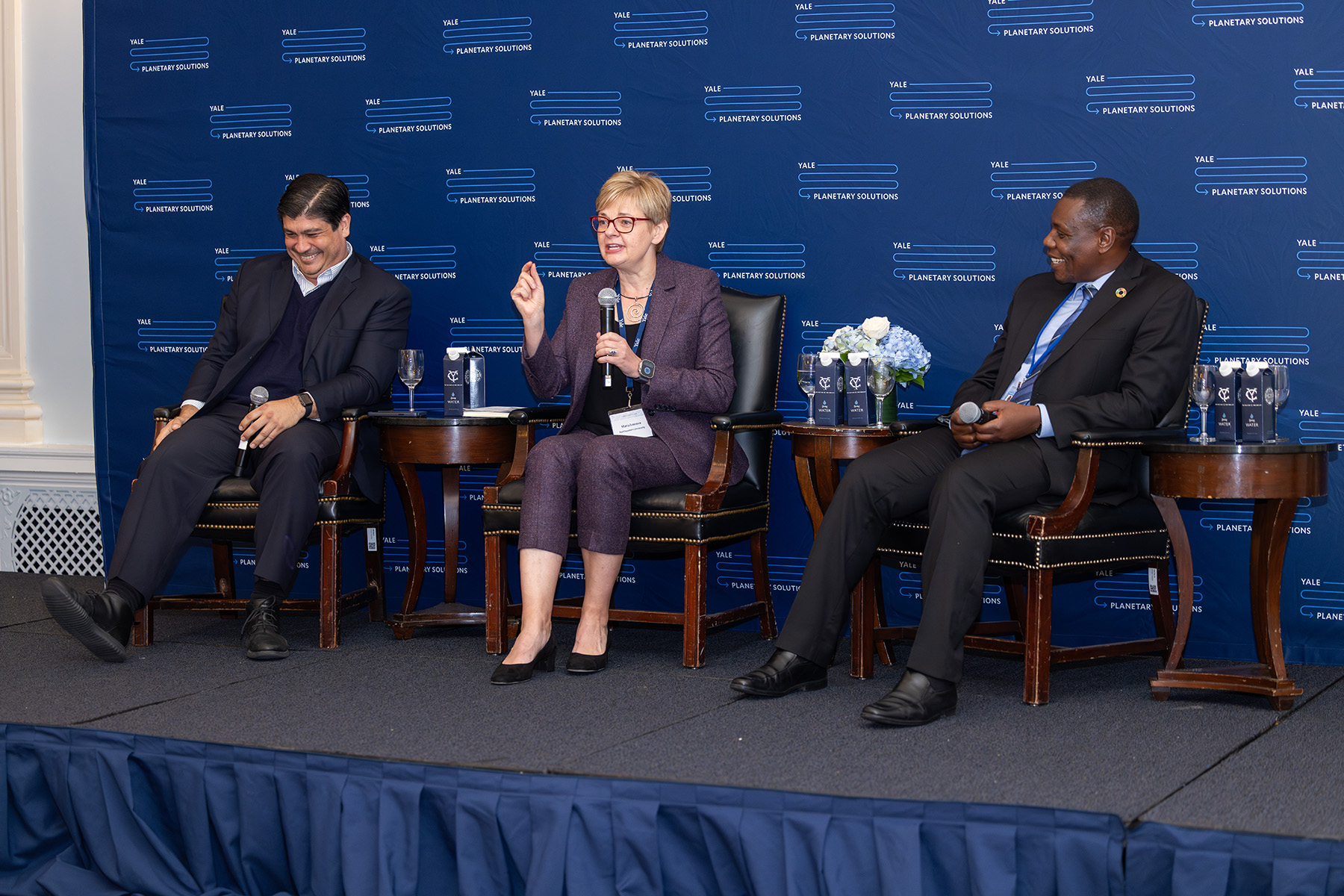“Science-policy diplomacy:” international experts tackle multilateralism and environmental governance during Climate Week
 Image: Yale OPAC
Image: Yale OPAC
Carlos Alvarado Quesada, Maria Ivanova, and Philip Osano (L to R) speak at the MacMillan Center's “Flipping the Model: Leveraging Academic Perspectives to Reinvent Multilateralism" panel discussion during Yale @ Climate Week 2024.
How can policymakers balance global climate agreements with local conditions? How can scientists shape policy?
In a panel convened by the MacMillan Center for International & Area Studies, three experts sat down to tackle these questions on September 25 during Yale @ Climate Week NYC.
Dr. Maria Ivanova, Director of the Northeastern University School of Public Policy and Urban Affairs, led a conversation with Carlos Alvarado Quesada, former President of Costa Rica, and Philip Osano, Director of the Africa Centre of the Stockholm Environment Institute, in a talk titled “Flipping the Model: Leveraging Academic Perspectives to Reinvent Multilateralism.” Ivanova, M.E.M ’99, M.A. ’99, Ph.D ’06, began the panel by emphasizing the importance of mentorship across generations.
Ivanova writes and researches extensively on international institutions and environmental governance. She highlighted the growth of the Global Environmental Governance (GEG) Project — which she co-founded with Dan Esty JD ‘86, the Hillhouse Professor of Environmental Law and Policy, while she was a master’s student at Yale in the late 1990s.
“We all stand on the shoulders of someone who’s been there before us,” Ivanova said.
Ivanova specifically named Philip Osano, who was one of the youth leaders selected by the GEG Project years ago and now leads mentorship programs in Kenya.
Osano discussed the disconnect between different generations as there are inadequate mechanisms for younger people to be involved in decision-making. Despite the disproportionate impacts of climate change on African countries, there is a shortage of African scientists featured in major climate reports, especially young scientists, Osano said. To fill this gap, Osano supports programs that link young African scientists with older mentor figures.
The Role of Science in Policymaking
Much of the discussion focused on the role of “science-policy diplomacy,” emphasizing the role scientists can play in policymaking arenas and the possible synergies between the two disciplines to respond to the climate crisis.
Osano, who has studied and worked in over a dozen countries, argued that this is a time when faith in science is declining in policymaking globally.
“It’s critical that we find a way to bring science back to the center,” he said.
Carlos Alvarado Quesada, who won several awards for his climate leadership while serving as President of Costa Rica from 2018-2022, acknowledged the frustration that exists over climate inaction. Alvardo posited that scientists must be able to understand the other existing issues linked to their specialty. By recognizing the other issues policymakers are considering, he argued, scientists can find a way to influence the policy sphere through "reading” the wider room.
One major theme for the panel was what role scientists should play within institutions. Alvarado recalled that scientific arguments for expansive protection of ocean and land resources contributed to the motivation for Costa Rica to adopt the Biodiversity 30x30 goal in 2021, an initiative that was considered impossible just a few years before.
“We need to shift from scaling methods to scaling impact,” Alvarado said.
Osano underscored that scientists and policymakers often have to establish trust, which can be a lengthy process, and that scientists play a difficult role in sometimes having to be the person who communicates a message policymakers may not want to hear. Osano also emphasized how many impactful decisions are made in short periods of time, and then can take years to reverse.
Contradictions of Scale
Carlos Alvarado now researches small state diplomacy in addition to teaching at the Tufts University Fletcher School of Law and Diplomacy as a Professor of Practice of Diplomacy.
While small states lack expansive resources, Alvarado emphasized their potential agility in responding to the climate crisis. Drawing on his experience governing Costa Rica, Alvarado noted how reports indicating that decarbonization would bring net benefits to the nation’s economy created synergistic evidence for climate policies despite fears of economic losses.
Alvarado argued that the lack of trust and knowledge sharing across large states or blocs of power limits the ability of scientists to advance the implications of their data.
“How do you measure trust?” Alvarado said. “Smaller countries are more likely to trust each other and share data. Bigger countries do not trust one another and do not share.”
Osano echoed this point, noting that before cooperation can happen, nations have to believe that scientific data will not serve to their disadvantage.
Building on her expertise in global environmental governance and the United Nations system, Ivanova reinforced the key points that our current approaches to multilateral collaboration have not been effective, and that there is a need to pivot to a fresh set of tactics that build trust, mobilize coalitions of the willing, and set aside ego.
Looking ahead to COP 30 in Brazil in 2025, Osano and Alvarado both emphasized the attention that will be paid to controversial financing practices for lower income nations that impede their ability to fund and maintain climate adaptation and mitigation, specifically around lending practices and high interest rates. Lower-income nations struggle to attain funding for climate technology, and high-income nations often fail to meet their commitments, Osano noted.
Yale @ Climate Week NYC, a four-day summit of Yale's top leaders, international experts, and field authorities in confronting the climate crisis, was held September 24-27, 2024.
- Climate Change